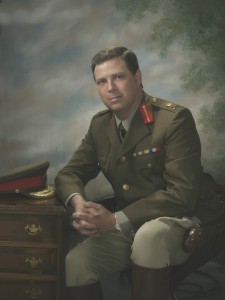In Flanders’ Fields
Take up our quarrel with the foe:
To you from failing hands we throw
The torch; be yours to hold it high.
If ye break faith with us who die
We shall not sleep, though poppies grow
In Flanders fields.
Last verse of “In Flanders’ Fields” by Lieutenant-Colonel John McCrae
John McCrae wrote this famous poem just after losing a close friend at the Second Battle of Ypres in the spring of 1915. While mourning his loss, he realized his friend’s death would not be in vain if others carried on the cause and defeated the aggressors.
In Christ’s Cause
The same idea of carrying on the cause applies to Christians, especially we who lead Christian ministries. Are we still carrying the torch, holding it high, for all those who have gone before us? Do we share their focus on our mission and their passion for our cause? Or have we professionalized ministry and now see it as just a program to be maintained?
We need the same passion and vision which led people to found the churches and ministries we now lead. A Christian version of McCrae’s poem might end like this:
Take up our cause for Christ and know
To you from failing hands we throw
The torch; be yours to hold it high.
Do not break faith with us who die!
Hold fast, work hard. Though trials grow,
God reigns above and here below.
As you read through the rest of this Remembrance Day post, keep the question “Are we worthy of their sacrifice?” in mind from a ministry perspective. Are you worthy of the sacrifices made by those who preceded you in your church or ministry? Reflecting on the question is one way to prevent mission drift.

General Sir Arthur Currie
One hundred years ago, Canada was forging its nationhood through its contribution to the war that was supposed to “end all wars.” Almost 61,000 Canadians gave their lives and another 172,000 were wounded in a war which they believed would lead to a better world of peace, justice, and good will.
The question we must ask today is the same question that General Sir Arthur Currie asked only fifteen years after the Great War’s end, “Where, ask the men who fought, is that new world of justice and good will they suffered so keenly to create?” Today we must ask ourselves, “Have we done all that we can to be worthy of their sacrifice?”
I do a one man performance of the Leadership Lessons From Vimy Ridge portraying General Sir Arthur Currie, who was the commander of the Canadian Corps. Under Currie, Canada never failed in a single assignment and never lost an inch of ground, In the last 100 days of the war, Canada’s four divisions defeated sixty-four enemy divisions.

Today, I’d like to present an excerpt from a speech Currie wrote for Remembrance Day 1933, which was called Armistice Day back then. His words are every bit as relevant today as they were 83 years ago! Here is what General Sir Arthur Currie had to say. You can either watch the video or read the text. Please agree with me in my prayer that concludes the text.
“Are we worthy of their sacrifice?”
We remember tonight, and it is well that our country should remember, the high resolves of that time fifteen years ago. There was unspeakable sorrow for the great army of youth that had gone so early to its death. We were told that the world would henceforth be safe for youth. But what of youth today, and the opportunity for youth in our modern world? Where, ask the men who fought, is that new world of justice and good will they suffered so keenly to create? Has the world, has our country, in the fifteen years since the Armistice, kept its promised faith with the unreturning dead? Has the great sacrifice really turned to glory, the glory of a better time? Has the world done anything more in these fifteen years than give lip-service to the ideals for which our fallen comrades gave their lives? The answer to these questions is found in the actual conditions of the hour. And these conditions are such that Armistice Day should smite the conscience of the world.
Bitterness and hate, selfishness and greed, are still entrenched in our social and economic and political life. Our world is a world of suffering, of uncertainty, of demon doubts and fears. Our world is not yet done with the necessity for heroism and sacrifice. We need, as never before, the healing qualities of devotion and fidelity and self-sacrifice and goodwill and comradeship and friendliness, so that suspicion may be vanquished and justice and mutual trust may be permanently enthroned. All this desire is in harmony with the real spirit of Armistice Day – the day dedicated to sacrifice and loyal remembrance of others.
I am not a pessimist when I think of the future. We have faith that these moments of discouragement are fleeting, and perhaps misleading; that those whose memories we especially cherish did not make their sacrifices in vain, and that in the end the stern determination of millions of men and women, who are minted with no spirit of unworthy pacifism, will prevail over those whose views would tend to perpetuate the horrors of war, even though some of these latter may be seated in the high places of national executive and legislative power.
Armistice Day is primarily a commemoration of the dead. But a commemoration of the dead should be likewise an appeal to the living not to deplore the past, but to awaken our sense of responsibility to make our world less deplorable. The disappointment – even the bitterness – of many who came back may be traced to the monstrous paradox that only because of the nobility of individual sacrifice does war in any way ennoble civilization.
We know from experience the stupidity of war, and the stupidity of those who made or caused wars. Does our responsibility end with condemning the follies of the stupid or the vicious twenty years ago? Are we doing all we can to prevent a catastrophe which we will later deplore? Are we fighting to the last, as we fought fifteen years ago, for the vitality and the continuity of civilized standards in public and private affairs, in national and international life? Are we fighting so that the next generation of youth will not condemn our stupidity as we condemned in the trenches the stupidity of our elders in 1914 and the era immediately before it? On those nights and days of suffering and death, when we saw our comrades fall in the fire of savages fed by the so-called gods of civilization, we endured and ‘carried on,’ in the firm hope that out of the embers and the broken human dust would rise a new order, in which war and greed and injustice would have no place. That hope will yet be realized, despite discouragements, even in a world which has to make its way out of sickness and despair, if we but keep our shield and our faith, and if we insist on leadership in all affairs that is not leadership for apathy.
We are to blame if we allow others, interested only in greed, to take the reins from our hands and drive us into another abyss.
The truest commemoration of our honoured dead will be in the vigorous enlistment of our own lives and capacities in the struggle between unselfishness and greed, honesty and corruption, justice and injustice, and in the serious application to our national problems of those qualities which distinguished our Corps in the war days, and enabled us always to advance and conquer.
Armistice Day reminds our country of the steadfastness of our fighting troops. It should also be a reminder to every citizen that he still has a duty to discharge, if the war is to be fully won and its high objectives permanently secured. It should call us to a realization that we still have to complete the unfinished task of our dead comrades who speak to us tonight with a voiceless eloquence – the task of replacing the present system of suspicion and fear and conflict with the enduring fabric of confidence in humane law and order.
And so, in conclusion, we drop the rose of remembrance on the supreme devotion of our sacred dead. We linger, like our country, in our tribute of reverent memory of our glorious youth who gave their lives to defend our liberty: “Sleep well, heroic souls.” And on this Armistice night, as we recall the nobility of your sacrifice, we turn away from trenches and wounds and death and we re-dedicate our lives with hope to the still unfinished work which you so gallantly advanced and for which you died.
My Prayer
Lord God, this world is as badly in need of peace and good will as it was 100 years ago. We acknowledge that as much as we can work for your justice in this world, ultimately it is you alone who can bring peace and good will to this world through your Son, our Lord Jesus Christ. May the promise of the heavenly multitude who sang to the shepherds at Jesus’ birth be fully realized: Glory to God in the highest, and on earth peace, good will toward men.


